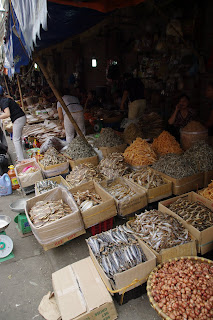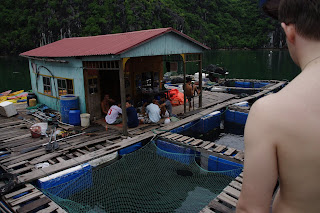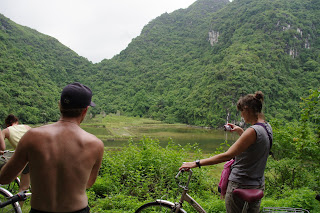I was waiting for the bus when a taxi-driver came to me. "Hue" he asked. I nodded. He wanted to see my ticket. I showed it to him. "Ok, come! I take you to the bus.". I protested, saying that the girl in the ticket office said that the bus would come to pick me up. "No, no. Too expensive. They send taxi instead!" I settled in the overcrowed taxi. The guy spoke with an accent so thick I thought he was speaking vietnamese. I looked at the spanish couple beside me. They looked as puzzled as me. Oh well. Who cared.
On the bus I eventually realized that I had gotten the by far worst sleeper seat in the bus. All the way in the back. Mid seat. Between two couples. And blocked by the sleeper in front of me, making my seat maximum 1.5 meters. Which would mean I would have to crumble the whole night. Did I mention the heat? If not, it was hot. And the aircon was only on about 5 minutes an hour. I was relieved when I leared the belgium couple next to me where only going as far as Nihn Bihn. 2 hours drive away. I hoped and prayed they would not be replaced. To my relief, they weren't. My louse seat was now the best seat in the bus. With vacant seats on both sides, and the longest seat on the bus just for me. I placed my bags on one of the seats and my water bottle on the other.
The ride was typical for vietnamese busrides. Most of the trip consisted of the driver playing "chicken" with all facing traffic. Turning over two the right hand side of the road only in the last second before impact. The bus swung back and forth with trucks, buses and cars coming at us at alarming speeds and rates. I just wasn't able to sleep all night. Partly because of the flashing lights and horns of oncoming traffic, but also because the driver, because of the way he drove, were either flooring the gas of the breakes, in addition to swinging back and forth between the lanes.
In the morning, we stopped at a local eatery, where they served anything we wanted to eat. I was too tired to be hungry. So I baught a can of coke and wandered around the joint. I realized we had just passed the DMZ. Old propaganda posters on the wall talking about the "evil americans and their puppet soldiers". I wanted to scream "Gooooood morning Vietnaaaaaaam!" in the spirit of Cronauer. The famous DJ from Radio Saigon. They transmitted to the american troops south of the DMZ.
We arrived in Hue early in the morning. To greet us was the usual crew of "catchers" trying to get us to come to their hotel. I followed one of them up the road. He promised me a premium room for $10. As we were approaching the hotel, he started talking about a neighbouring hotel, which had MUCH MUCH better rooms for $15. Of course... I followed the manager up to one of the MUCH MUCH better rooms, only to find that the MUCH MUCH better involved TWO beds instead of one, in case I needed to spread my body, and a tiny veranda facing the backyard. I wanted to see the $10 room. It had "only" one bed, and no balcony. Suited me fine. I wasn't going to sit on no balcony anyway. The guy wasn't too happy with me choosing the "inferior" room, but he accepted it.
As usual, I was given a map of the city by the receptionist. It looked handmade. So I didn't really know whether to trust it or not. But to test it out, I did what I normally do when I get to a new place ; start walking. Noticing misplaced streets on the map, or wrong scales. After a few hours, I was sweaty, tired and hungry. I found a small sidewalk cafe whose only customer was the odd american couple. He was in his 60's I would think, with Coke-bottle glasses and a body that said "experienced traveller who has drunk himself snowblind in most bars across the earth". His travelling companion was a girl in her twenties. The old geezer was looking at me as if he tried to stare me to death or something. I ignored him. Sat down and ordered som noodle soup with chicken. A delicious and filling meal later, I was ready to hit the sack for a few hours while the sun was doing her best to scorch the Earth.
Waking upThe next day I walked across the river to the Citadel. The old fortress town where the emperor used to live. After a couple of hours walking around the whole citadel,


I walked along the street by the river. A lot of old stuff, and war relics were displayed for sale on the sidewalk. A lot of medals, old coins and gas masks. But one thing made me shrug. In the movie "Falling down", the main character played by Michael Douglas comes into an "army shop" run by a seriously deranged person. The shop-owner shows off his secret stash. He picks up a canister used for "Zyklon B". The gas used to kill jews in the death camps. He shook it and uttered with great enthusiasm : "You hear that? Its empty. It has been used!".

I felt much in the same way now. In front of me lay scores of dog tags. "From captured and killed american soldiers" the seller told me. I felt disgusted. Captured and killed. Gomez, Steele, Hodges. O negative. Baptist. Catholic. Serial number. Boys from upshit creek. Places nobody had heard of, let alone wanted to. Going to fight a war in a country most people had never heard of, let alone cared about. Until some "commies" decided they wanted a piece of the action, and Uncle Sam didn't want them to. "Kill a commie for mommie". Instead of glory and a welcome home party, they, or what was left of them, were sent home in bodybags. And their dog tags sold as souvenirs on the streets of Hue. By the way. If you search american homes, I am sure you find a lot of "souvenirs" there too.
I saw a movie yesterday. "Freedom Writers". A true story about an american teacher whose determination turned a class of "misfits" into productive young men and women. "You think respect is something you earn when you are killed by a gun? When you are dead, you are rotting underground. And nobody remembers you!" she said to one of her students. She found to her astonishment that none of the students knew what the holocaust was. She took them to the holocaust museum, and let them speak to holocaust survivors. It made them realize that their thoughts and street code was just the same that started the holocaust. "Remove this group, and my life will be perfect."
She earned their respect, and they realized she was right. Street code and honour was the name of their game. She taught them how to break free from this thought prison.
A prison made for them by their parents and peers. Nobody are born hating. They are taught to hate. By the media. By politicians. Religious leaders. The 'hood. Using fear and threats. Breaking the pattern, the code, and you will be severly punished. Think otherwise, and you will be expelled from the society.
In the visitors log of the genocide museum in Kigali, Rwanda, I wrote "when will we ever learn?". When will we?
Killing isn't glorious, honorous or heroic. Preventing it, is.
Ragnar






















































